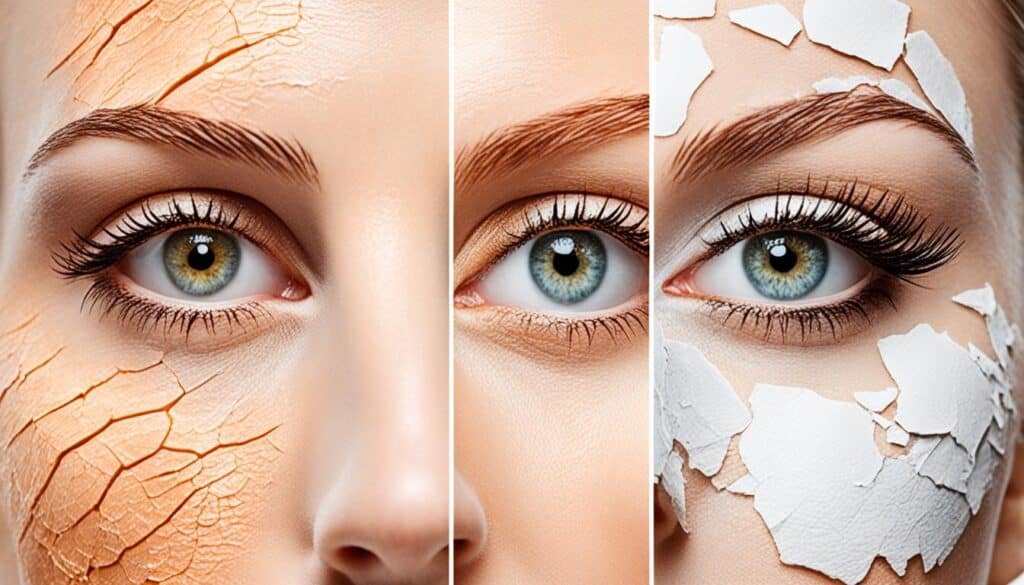Skin Care Routine for Dry Skin : Dry skin requires special attention and care to maintain its health and hydration. A tailored skincare routine can help alleviate the discomfort and characteristic symptoms of dry skin, such as tightness, flakiness, and itchiness. By incorporating essential products and following a nourishing regimen, you can achieve a softer, more hydrated complexion.
Key Takeaways:
- Choose gentle cleansers to avoid stripping the skin of its natural oils.
- Hydrating toners help restore moisture and balance to dry skin.
- Opt for oil-based serums with moisturizing ingredients like hyaluronic acid and vitamin E.
- Moisturizers with hyaluronic acid, glycerin, and ceramides are essential for replenishing and retaining moisture.
- Don’t forget to protect your skin with a broad-spectrum sunscreen.
Why Do People with Dry Skin Need a Special Skincare Routine?
People with dry skin require a specialized skincare routine because certain products and habits can exacerbate dryness and lead to further irritation. It is crucial to understand the unique needs of dry skin types and choose products that promote hydration and protect the skin barrier.
Dry skin is characterized by a lack of moisture and natural oils, which can result in tightness, flakiness, and discomfort. Environmental factors, such as exposure to harsh weather conditions and pollution, can further damage the skin and intensify dryness.
Hot showers and long hot baths: indulging in long, hot showers and baths may be tempting, but they can strip the skin of its natural oils, making dryness worse. It is advisable to limit the time and temperature of your showers and baths to prevent excessive moisture loss.
Harsh cosmetics and cleansers: certain cosmetic products and cleansers can contain harsh ingredients that can irritate and dry out the skin. Avoid products that contain high levels of alcohol, fragrances, and strong surfactants.
Soap and fragrance: soaps and products with strong fragrances can be drying and irritating for dry skin. Opt for gentle cleansers that are specifically formulated to hydrate and nourish the skin without stripping its natural oils.
People with dry skin are also more prone to various skin conditions like eczema and psoriasis. These conditions can cause additional dryness, inflammation, and discomfort. Therefore, it is essential to choose skincare products that are gentle and suitable for sensitive skin.
Here are some key aspects to consider when developing a special skincare routine for dry skin:
- Use gentle cleansers that do not strip the skin’s natural oils.
- Moisturize regularly with hydrating products that contain ingredients like hyaluronic acid, glycerin, and ceramides.
- Protect the skin from environmental damage by using broad-spectrum sunscreen.
By incorporating these practices into your skincare routine, you can help replenish moisture in the skin, strengthen its barrier function, and maintain a healthier and more comfortable complexion.
Basic A.M. and P.M. Skin Care Routine for Dry Skin
Proper skincare is crucial for maintaining the health and hydration of dry skin. By following a basic skincare routine tailored to your needs, you can nourish and replenish your skin, leaving it feeling soft, supple, and moisturized throughout the day. Here’s a guide to a simple A.M. and P.M. skincare routine for dry skin:
Morning Routine:
- Hydrating Facial Cleanser: Start your morning by washing your face with a gentle, hydrating facial cleanser. This will remove any impurities without stripping your skin of its natural oils.
- Hydrating Toner: After cleansing, apply a hydrating toner to restore moisture and balance the pH of your skin. Look for toners that contain ingredients like hyaluronic acid or glycerin.
- Serum: Next, apply a lightweight serum that is packed with hydrating ingredients. Hyaluronic acid and vitamin E are excellent choices for adding moisture to the skin.
- Moisturizer: Follow up with a moisturizer specifically formulated for dry skin. Look for ingredients like hyaluronic acid, glycerin, and ceramides, which help to lock in moisture and soothe dryness.
- Sunscreen: Finish your morning routine with a broad-spectrum sunscreen to protect your skin from harmful UV rays. Opt for a sunscreen with hydrating properties to further nourish your dry skin.
Evening Routine:
- Oil-Based Hydrating Cleanser: In the evening, start by removing makeup and impurities with an oil-based hydrating cleanser. This will effectively cleanse your skin without drying it out.
- Water-Based Cleanser: Follow up with a water-based cleanser to thoroughly remove any remaining residue. Look for a cleanser with hydrating ingredients to maintain moisture levels.
- Gentle Exfoliant: Exfoliate your skin once or twice a week using a gentle exfoliant. This will help remove dead skin cells and promote cell turnover, revealing a smoother and brighter complexion.
- Hydrating Toner: After exfoliating, apply a hydrating toner to replenish moisture and restore pH balance to your skin.
- Hydrating Serum: Follow with a hydrating serum enriched with ingredients like hyaluronic acid, vitamins C and E, to deeply moisturize and revitalize your skin.
- Eye Cream: Gently pat on an eye cream to hydrate the delicate skin around your eyes and minimize the appearance of fine lines and wrinkles.
- Moisturizer: Apply a nourishing moisturizer that suits your skin’s needs, focusing on areas prone to dryness. Look for ingredients that provide intense hydration and improve your skin’s barrier function.
- Sleeping Mask: For an extra boost of hydration, use a sleeping mask as the last step in your evening routine. This overnight treatment will help lock in moisture, leaving your skin plump and refreshed in the morning.
- Facial Oil (Optional): If desired, incorporate a facial oil into your evening routine. Facial oils help to seal in moisture and provide additional nourishment to your skin.
Remember to apply your skincare products to damp skin to maximize absorption and hydration. Follow this basic A.M. and P.M. skincare routine consistently to keep your dry skin moisturized and protected throughout the day and night.
Body Care for Dry Skin
While dry skin is commonly associated with the face, it can also affect other parts of the body. Proper body care is essential to combat dryness and maintain a healthy, hydrated skin barrier. Incorporating certain practices and using moisturizing products with natural ingredients can help restore moisture and promote smooth, supple skin.
Hydrating from within is a crucial step in caring for dry skin on the body. Drinking plenty of water helps to keep the skin hydrated and supports overall skin health. Adequate hydration from the inside out can minimize dryness and improve the skin’s appearance.
When it comes to moisturizers, opt for products that contain natural ingredients known for their hydrating properties. Shea butter, coconut oil, and aloe vera are excellent choices for nourishing dry skin. These ingredients are rich in vitamins and antioxidants that replenish the skin’s moisture levels, soothe irritation, and promote a healthy complexion.
Additionally, incorporating a humidifier into your routine can make a significant difference in combating dry skin. Humidifiers add moisture to the air, which helps prevent excessive evaporation of moisture from the skin. This can create a more favorable environment for your skin, especially in dry climates or during the winter months.
| Ingredients for Body Care | Benefits |
|---|---|
| Shea butter | Provides intense hydration, improves skin elasticity |
| Coconut oil | Locks in moisture, soothes dryness and irritation |
| Aloe vera | Soothes and calms dry, inflamed skin, acts as a natural moisturizer |

By hydrating from within, using moisturizers with natural ingredients, and incorporating a humidifier into your routine, you can effectively combat dry skin on the body. These practices will ensure your skin stays hydrated and nourished, promoting a smooth and supple complexion.
Dry Skin vs Dehydrated Skin
Understanding the difference between dry skin and dehydrated skin is crucial for developing an effective skincare routine. While these terms are often used interchangeably, they actually refer to distinct conditions with different underlying causes and treatment approaches.
Dry skin is a skin type that lacks sufficient moisture and natural oils. It is characterized by symptoms such as tightness, flakes, and itchiness. Dry skin can be caused by various factors, including:
- Environmental factors: Exposure to harsh weather conditions, such as low humidity or cold temperatures, can strip the skin of its natural oils and moisture.
- Lifestyle habits: Long hot showers, excessive use of harsh soaps or fragranced products, and the use of drying cosmetics can contribute to dry skin.
- Genetics: Some people are genetically predisposed to having naturally drier skin.
- Existing skin conditions: Skin conditions like eczema or psoriasis can disrupt the skin barrier function, leading to dryness.
Dehydrated skin, on the other hand, is a condition that results from a lack of water in the skin, irrespective of skin type. Dehydration can occur due to internal or external factors, such as:
- Internal causes: Dehydration within the body, which can result from inadequate water intake or certain medical conditions, can lead to dehydrated skin.
- External causes: Environmental factors like excessive exposure to air conditioning, heating, or dry climates can cause water loss from the skin, contributing to dehydration.
It’s important to note that while dry skin lacks both moisture and natural oils, dehydrated skin specifically lacks hydration, regardless of the skin’s oil production.

| Dry Skin | Dehydrated Skin |
|---|---|
| Lacks moisture and natural oils | Lacks hydration |
| Caused by environmental factors, lifestyle habits, genetics, or existing skin conditions | Caused by internal or external factors like dehydration, weather changes, or excessive exposure to air conditioning or heating |
| Manifests as tightness, flakes, and itchiness | Manifests as dullness, increased sensitivity, and a compromised skin barrier |
Recognizing whether you have dry skin or dehydrated skin is essential for selecting the appropriate skincare products and treatments to address your specific needs. By understanding the unique characteristics of each condition, you can develop a tailored routine that effectively restores moisture, nourishes the skin barrier, and promotes a healthy complexion.
5 Benefits of a Skincare Routine for Dry Skin
A skincare routine tailored for dry skin can provide significant benefits for your skin health and appearance. By following a consistent regimen that includes moisturizing products and targeted treatments, you can experience visible improvement in various skin concerns, achieving a soft and delightful complexion. Let’s explore the five key benefits of a skincare routine for dry skin:
1. Reduction of Fine Lines and Wrinkles
Dry skin is often associated with the development of fine lines and wrinkles. However, a well-designed skincare routine can combat these signs of aging by deeply hydrating the skin and improving its elasticity. Proper hydration helps plump up the skin, minimizing the appearance of fine lines and wrinkles, and leaving you with a smoother and more youthful complexion.
2. Prevention of Acne Breakouts
Contrary to popular belief, dry skin is not immune to acne breakouts. In fact, insufficient moisture can lead to the overproduction of sebum, clogged pores, and the formation of acne. A skincare routine specifically formulated for dry skin can help prevent acne by effectively eliminating excess sebum and gently removing pore-clogging dead skin cells. This way, you can maintain clear and blemish-free skin.
3. Refinement of Skin Texture
Dry skin is often characterized by rough and uneven texture. However, a dedicated skincare routine can transform your skin’s texture, making it more refined and smooth. Consistent use of moisturizing products and gentle exfoliation can effectively slough off dry patches and promote a healthier, more even skin surface.
4. Hydration and Delightful Comfort
One of the primary goals of a skincare routine for dry skin is to provide the necessary moisture to combat tightness, itchiness, and discomfort associated with dryness. By incorporating hydrating cleansers, toners, serums, and moisturizers into your daily regimen, you can keep your skin consistently moisturized, resulting in a soft and delightful sensation.
5. Greater Protection and a Glowing Complexion
A well-maintained skincare routine for dry skin helps strengthen the skin’s natural moisture barrier, providing greater protection against external aggressors. By properly nourishing and hydrating your skin, you can minimize dry skin problems such as flakiness, sensitivities, and irritations. As a result, your skin will appear more radiant, with a healthy and glowing complexion.
Implementing a skincare routine tailored for dry skin can offer remarkable benefits, from minimizing the signs of aging to achieving a healthier and more radiant complexion. By providing ample moisture, gentle care, and suitable products, you can enhance the appearance and overall health of your skin.

“A skincare routine tailored for dry skin can provide remarkable benefits, from minimizing the signs of aging to achieving a healthier and more radiant complexion.”
| Benefits | Description |
|---|---|
| Reduction of Fine Lines and Wrinkles | Helps hydrate the skin and improve elasticity, reducing the appearance of fine lines and wrinkles. |
| Prevention of Acne Breakouts | Eliminates excess sebum and pore-clogging dead skin cells, preventing acne breakouts. |
| Refinement of Skin Texture | Transforms rough and uneven skin texture, resulting in a more refined and smooth complexion. |
| Hydration and Delightful Comfort | Provides necessary moisture to combat tightness, itchiness, and discomfort, leaving the skin soft and delightful. |
| Greater Protection and a Glowing Complexion | Strengthens the skin’s natural moisture barrier, protecting against external aggressors and promoting a radiant complexion. |
How to Determine if You Have Dry Skin
To identify if you have dry skin, it’s essential to recognize specific signs and symptoms. Pay attention to the following indicators:
- Tight skin: Dry skin often feels tight and uncomfortable.
- Fine lines and wrinkles: Dry skin is prone to the appearance of fine lines and wrinkles.
- Flaky patches of skin: Look out for areas of skin that have dry and flaky patches.
- Rough texture: Dry skin may feel rough to the touch and lack smoothness.
- Redness and irritation: Dry skin can be accompanied by redness and irritation.
- Dull appearance: Dry skin tends to have a lackluster and dull appearance.
If you experience these symptoms, it is likely that you have dry skin. In that case, it’s important to focus on a skincare routine specifically designed to address dry skin concerns.
Ingredients to Look for With Dry Skin
When it comes to choosing skincare products for dry skin, it is important to prioritize ingredients that are ultra-hydrating and have the ability to attract and retain moisture in the skin. These ingredients work together to provide the necessary hydration and nourishment that dry skin needs. Here are some key ingredients to look for:
Hyaluronic Acid

Hyaluronic acid is a well-known and highly effective hydrating ingredient. It has the ability to deeply hydrate the skin and improve its elasticity, making it appear plump and youthful. Hyaluronic acid attracts moisture from the environment and locks it into the skin, providing long-lasting hydration.
Lanolin
Lanolin is a moisturizing ingredient derived from sheep’s wool. It is known for its excellent emollient properties, which help repair and restore dry skin. Lanolin creates a protective barrier on the skin’s surface, preventing moisture loss and improving water retention. It is especially beneficial for those with extremely dry or damaged skin.
Also Read : Essential Men’s Skin Care Routine Tips & Tricks
Avocado Oil
Avocado oil is packed with essential fatty acids and vitamins, making it a nourishing ingredient for dry skin. It helps to improve the skin’s moisture retention and enhance its natural barrier function. Avocado oil is easily absorbed into the skin, leaving it soft, supple, and deeply hydrated.
When searching for skincare products for your dry skin, look for these ultra-hydrating ingredients like hyaluronic acid, lanolin, and avocado oil. They will help replenish and retain moisture in your skin, leaving it nourished, hydrated, and healthy.
Conclusion
A skincare routine tailored for dry skin is essential for achieving optimal skin health. By following a proper routine that includes gentle cleansers, hydrating toners, moisturizers with hydrating ingredients, and broad-spectrum sunscreen, you can visibly improve the appearance of your skin.
With a consistent skincare routine, you can effectively reduce dryness and flakiness, resulting in softer and more nourished skin. Additionally, this routine helps maintain a healthy moisture barrier, preventing further dryness and irritation. By incorporating hydrating products into your daily regimen, you can protect your skin from environmental aggressors and prevent dryness.
With the right combination of hydrating products and dedication to your skincare routine, you can achieve a luminous and healthy complexion. Say goodbye to dry skin and hello to a well-hydrated, protected, and glowing appearance.
FAQ
Q: What are the essentials of an optimal skin care routine for dry skin?
A: An optimal skin care routine for dry skin should include gentle cleansers, hydrating moisturizers, serums with hydrating ingredients like hyaluronic acid, and SPF to protect from sun damage.
Q: How important is it to consult with a dermatologist for a dry skin care routine?
A: Consulting with a dermatologist is crucial for developing a personalized dry skin care routine as they can recommend the best products and treatments based on your specific skin needs.
Q: What ingredients should I look for in a moisturizer for dry skin?
A: Look for ingredients like hyaluronic acid, glycerin, ceramides, and shea butter in moisturizers for dry skin as these help to hydrate and repair the skin’s moisture barrier.
Q: Is it important to moisturize both morning and night for dry skin?
A: Yes, it is important to moisturize both morning and night for dry skin to keep your skin hydrated throughout the day and help repair overnight.
Q: What should I include in my nighttime skincare routine for dry skin?
A: In your nighttime skincare routine for dry skin, you should include a hydrating cleanser, a nourishing serum, a rich moisturizer, and possibly a face oil or balm for added hydration.
Q: How can I best care for my dry skin if it still feels flaky after moisturizing?
A: If your skin still feels flaky after moisturizing, add a hydrating balm or face oil to seal in moisture and prevent further dehydration.
Q: Are there specific products for dry skin that are recommended by dermatologists?
A: Dermatologists often recommend products for dry skin that contain hyaluronic acid, ceramides, and gentle exfoliants to help boost hydration and improve the skin’s texture.
Source Links
- https://www.byrdie.com/dry-skincare-routine
- https://asianbeautyessentials.com/blogs/the-idol-beauty-blog/skin-care-routine-for-dry-skin
- https://augustinusbader.com/us/en/evidence/skincare-routine-for-dry-skin




